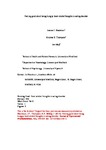Feeling good about being hungry: food-related thoughts in eating disorder
| dc.contributor.author | Blackburn, JF | |
| dc.contributor.author | Thomson, AR | |
| dc.contributor.author | May, Jon | |
| dc.date.accessioned | 2012-05-18T15:44:42Z | |
| dc.date.available | 2012-05-18T15:44:42Z | |
| dc.date.issued | 2012 | |
| dc.identifier.issn | 2043-8087 | |
| dc.identifier.issn | 2043-8087 | |
| dc.identifier.uri | http://hdl.handle.net/10026.1/999 | |
| dc.description.abstract |
Objectives: This study explores the relationships to food and hunger in women living with anorexic type eating difficulties and asks how imagery-based elaborations of food and eating thoughts are involved in their eating restraint, and recovery. Design: The qualitative idiographic approach of Interpretative Phenomenological Analysis (IPA) was used. Four in-depth semi-structured interviews were conducted with women self-selected as having experienced anorexia or anorexic like behaviour. Methods: The data was analysed using IPA and an audit of the analysis was conducted to ensure that the process followed had been systematic and rigorous and appropriately considered reflexivity. Results: Hunger was perceived positively by participants as confirmation that they were achieving their goal of losing weight, or avoiding weight gain. Hunger conferred a sense of being in control for the participants. Intrusive thoughts about food were reported as being quickly followed by elaborative mental imagery of the positive aspects of weight loss, and the negative consequences of eating. Imagery appeared to serve to maintain anorexic behaviours rather than to motivate food seeking. However, negative imagery of the consequences of anorexia were also described as supporting recovery. Conclusions: The finding that physiological sensations of hunger were experienced as positive confirmation of maintaining control has potentially important clinical and theoretical implications. It suggests further attention needs to be focused upon how changes in cognitive elaboration, involving mental imagery, are components of the psychological changes in the development of, maintenance of, and recovery from, anorexia. | |
| dc.format.extent | 243-257 | |
| dc.language | en | |
| dc.language.iso | en | |
| dc.publisher | SAGE Publications | |
| dc.subject | Clinical Research | |
| dc.subject | Nutrition | |
| dc.subject | Mental Health | |
| dc.subject | Eating Disorders | |
| dc.subject | Anorexia | |
| dc.subject | 7.1 Individual care needs | |
| dc.subject | Mental health | |
| dc.subject | 2 Zero Hunger | |
| dc.title | Feeling good about being hungry: food-related thoughts in eating disorder | |
| dc.type | journal-article | |
| dc.type | Article | |
| plymouth.issue | 2 | |
| plymouth.volume | 3 | |
| plymouth.publication-status | Published | |
| plymouth.journal | Journal of Experimental Psychopathology | |
| dc.identifier.doi | 10.5127/jep.018711 | |
| plymouth.organisational-group | /Plymouth | |
| plymouth.organisational-group | /Plymouth/Faculty of Health | |
| plymouth.organisational-group | /Plymouth/Faculty of Health/School of Psychology | |
| plymouth.organisational-group | /Plymouth/REF 2021 Researchers by UoA | |
| plymouth.organisational-group | /Plymouth/REF 2021 Researchers by UoA/UoA04 Psychology, Psychiatry and Neuroscience | |
| plymouth.organisational-group | /Plymouth/REF 2021 Researchers by UoA/UoA04 Psychology, Psychiatry and Neuroscience/UoA04 REF peer reviewers | |
| plymouth.organisational-group | /Plymouth/Research Groups | |
| plymouth.organisational-group | /Plymouth/Research Groups/Centre for Brain, Cognition and Behaviour (CBCB) | |
| plymouth.organisational-group | /Plymouth/Research Groups/Centre for Brain, Cognition and Behaviour (CBCB)/Behaviour | |
| plymouth.organisational-group | /Plymouth/Research Groups/Institute of Health and Community | |
| plymouth.organisational-group | /Plymouth/Users by role | |
| plymouth.organisational-group | /Plymouth/Users by role/Academics | |
| dc.identifier.eissn | 2043-8087 | |
| dc.rights.embargoperiod | Not known | |
| rioxxterms.versionofrecord | 10.5127/jep.018711 | |
| rioxxterms.licenseref.uri | http://www.rioxx.net/licenses/all-rights-reserved | |
| rioxxterms.type | Journal Article/Review |


